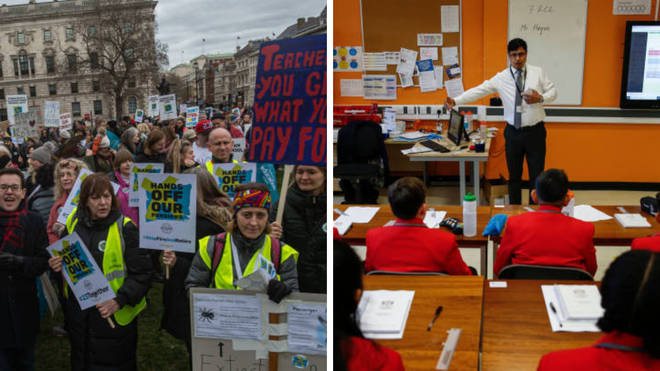When are the upcoming teacher strikes in the UK? Unions confirmed a series of strike dates in the UK as they join the mass walk-out by public sector workers including the Royal Mail, NHS nurses and railways.
The teachers strike in the UK, as voted by members of the NEU, the largest teachers union, will see tens of thousands of staff in England, Scotland and Wales vacate the classroom.
The move has been condemned by ministers and some other teachers, who are worried about the impact on children who have already had their learning and education affected by the Covid-19 pandemic.
The teacher strike announcement comes after a series of public sectors, including NHS nurses, trains and Royal Mail, have all been staging walkouts as they fight for more pay to combat inflation from the cost of living crisis.
Here’s everything you need to know about the UK teacher strike including dates, reasons and whether schools will have to close.
Why are teachers striking in the UK?
Teachers are walking out because they want to pressure the government into giving them a pay rise.
Union members argue that their salaries have been eroded by inflation, and want wages increased to compensate for that.
This puts them in line with workers in other sectors who have also gone on strike in recent months, including nurses and ambulance staff in the NHS, and railway employees.
Most teachers in England and Wales were given a 5% pay rise last year, inflation was at nearly 11% in December 2022.
The NEU said in a statement: “The ballot is a result of failure by the secretary of state in England and the employers in Wales to ensure enough money is available to pay a fully-funded increase in pay for teachers which at least matches inflation, and which begins to restore lost pay.”
The union said that turnout for the vote on whether to strike was about 50%, with about 90% of teachers who cast their ballots voting in favour of walking out. That means less than half of NEU members voted to strike.
Head teachers and support staff in England will not go on strike, as not enough voted in favour.
Teachers in Northern Ireland are not striking, but they are reducing their work by not doing lesson plans and not answering emails outside of work hours.
When are teacher strike dates?
Union members voted to go on strike on seven days in February and March.
These are:
- Wednesday, February 1: all eligible members in England and Wales
- Tuesday, February 14: all eligible members in Wales
- Tuesday, February 28: all eligible members in Northern, North West, Yorkshire & The Humber regions
- Wednesday, March 1: all eligible members in East Midlands, West Midlands, Eastern regions
- Thursday, March 2: all eligible members in London, South East, South West regions
- Wednesday, March 15: all eligible members in England and Wales
- Thursday, March 16: all eligible members in England and Wales
The NEU said that any individual school will only be affected by strikes on a maximum of four days.
Will schools close for the teacher strikes?
It’s likely that many schools will close because of the strikes, although the department for education said head teachers should take “all reasonable steps” to stay open amid the walkouts.
The NEU has to give two weeks’ notice of a strike for each school, to give remaining staff and students time to prepare for colleagues’ absence.
Much teaching is likely to go back online during the strikes, similar to during the pandemic.
The rules for when a school stays open vary for different countries within the UK.
In England, headteachers decide whether to close their school, and there are no minimum staffing levels for when it has to close.
In Wales, the headteachers make a call alongside their local authority. In Scotland, the local authority decides.
Education secretary Gillian Keegan told LBC that her department has given out guidance to schools on how to stay open as much as possible and for as many children as possible.
She told Nick Ferrari that she asked headteachers “to prioritise vulnerable children, exam cohorts and children of critical workers”.
What has the government said?
Ms Keegan told LBC on Tuesday that the strikes were “deeply disappointing”.
She added: “Obviously, we deeply regret that they have chosen to take this action…
“It is disappointing. Our children have suffered so much during the pandemic, and the teachers have done an amazing job at helping them bounce back after that.
“They’ve delivered about three million catch up or tutoring lessons, but we know we’ve still got more to do, so we do think it’s important that children stay in school.
“And we’ll be doing everything we can to work with headteachers to make that happen.
Ms Keegan is meeting the NEU on Wednesday for talks. The government has previously said to other striking workers that pay increases for them would help drive more inflation.
Unions disagree, pointing out that much of inflation is down to rising energy prices.
What has the union said about the strike?
Joint general secretary of the NEU Mary Bousted said: “We have continually raised our concerns with successive education secretaries about teacher and support staff pay and its funding in schools and colleges, but instead of seeking to resolve the issue they have sat on their hands.
“The government still insists pay demands are unaffordable and says it believes wage increases should be decided by pay review bodies.
By Kit Heren@yung_chuvak





